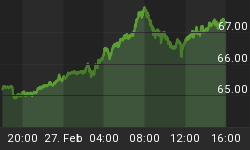With Spanish bond yields reflecting euro-era record high concern about Spain's ability to repay its debts, the financial markets are expecting some quick and significant action from European leaders. The markets will most likely be disappointed. A June 13 Bloomberg story summed up Germany's stance:
Chancellor Angela Merkel rejected quick solutions proposed to fix Europe's financial crisis such as joint debt sharing, saying Germany can't save the world economy alone and fellow Group of 20 countries must help.
The markets understand Germany does not have unlimited resources, something the German leader acknowledged:
"All resources, all measures, all packages will end up being smoke and mirrors if it becomes clear in the end that they extend beyond Germany's capacity."
The reality of the situation is there is just too much debt. We noted back in October 2011 the dual problems of too much sovereign debt and unstable banks are a deadly combination. That theory has become abundantly clear in Spain. The country of Spain is saddled with excessive debt relative to tax revenues. The Spanish banking system is crumbling under the weight of distressed real estate loans. Typically, a government steps in to assist the banks. Spain simply does not have the money to address their banking crisis.
Germany is often portrayed as being unreasonable, but they understand their own credit rating is at risk. Recent media reports, including a June 13 Financial Times story, point toward a slow and painful resolution process in Europe. Slow and painful are terms that do not align well with the short-sighted mentality on Wall Street. Bloomberg reinforced the path Germany plans to take:
Finding a solution is a "Herculean task" that requires European nations to embrace "political union" step by step, giving up some national powers in the process, said Angela Merkel.
When leaders move too slowly, Wall Street looks to the European Central Bank (ECB) and Fed. The central banks will most certainly step in - right? We believe the central banks will try to remain on the sidelines as long as possible, especially the ECB. Why? If the ECB announces another round of bank loans prior to the June 28-29 EU summit, Germany will lose significant leverage in their quest to integrate Europe (increase oversight and controls before writing more checks). The ECB wants no part of continually bailing out the over-indebted system. Therefore, they tend to favor the same approach as Germany.
The Fed is a harder read at this point. President Obama's bid for a second term is closely tied to events in Europe, and more importantly the 401(k) balances of U.S. voters. While the Fed is expected to remain politically neutral, the fact is the Fed Chairman is chosen by the President.
As Greeks prepare to cast their votes this weekend, the state of the global financial system is best summed up via Spanish and Italian bonds. From Bloomberg:
Spain's 10-year borrowing costs rose to a euro-era record as the nation's credit rating was cut to one step above junk by Moody's Investors Service after it asked for aid to support its lenders this week. Italy's yields reached the highest in almost five months as the nation's borrowing costs jumped at a sale of 4.5 billion euros ($5.7 billion) of three-, seven- and eight-year notes.

The financial markets expect quick action from European leaders to plug holes in the rapidly sinking debt craft. Germany and the ECB want to see significant and time-consuming changes to the political and fiscal structure of Europe.
The Fed may be the most logical candidate to calm the waters in the short-run. The Open Market Committees' statement is due at 12:30 PM ET on Wednesday, June 20.
As we noted on June 13, yields and stock market momentum tell us it is premature for longer-term investors to take the recent stock market gains too seriously. We continue to believe 1,250 is a bull/bear demarcation level on the S&P 500. A wait and see approach remains prudent until the markets show a few more cards.















